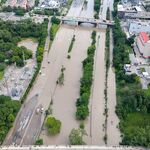I think that article sums up what every world leader is going through in the face of interest rates and inflation.
While these are certainly recent/immediate issues; there has been widespread disenchantment with 'establishment' leaders in larger countries in 'The West' for some time now.
This has seen extremists elected to government in Italy and Hungary, and other places; it fostered the UK's Brexit and saw the election of Trump back in 2016.
***
Lets be frank, political leadership in many western nations for the last 2-4 decades have had similar issues.
1) The leaders tend to read as being from and supportive of 'The Elite'. I don't mean this in some conspiratorial way, but in the way of a trendline of decades of more free trade and lower corporate taxes
with those moves resulting in lower wages, particularly for Blue Collar and entry level workers, and higher rates of personal income tax or VAT (sales tax) often with tax shelters sprinkled in that only those with significant funds can properly access.
2) A period of high change; society rarely stands still, change is a constant, but there has been a sense from many that its been a bit relentless and much of it has not been kind to middle and lower income voters. This is the Eurozone, NAFTA/USMCA; its high immigration, legal, and illegal and in the U.S. is also mass shootings and the like and a sense that government seems incapable of tackling crises or slowing change in the least.
3) A sense that leadership isn't entirely honest. (it never was, but I digress); the point is more one of 'on top of everything else'; governments are slow to honestly explain plans, policies and tough choices; and when they do so, reluctantly and poorly, anger only grows.
Too many leaders give off the vibe of representing Goldman Sachs rather than the electorate.
****
The above is Macron to be sure, its Sunak to a degree. (The former was associated with Rothschild while the latter literally worked at Goldman from 2001 - 2004)
The ties between official Washington and Goldman are legendary and cross party lines:
Sidney Weinberg, “Mr. Wall Street,” began a tradition of Goldman executives taking on public service that is continuing under President Trump.

www.nytimes.com
Former PMs in Italy and Australia had linkages too.
That said, the point is not to skewer Goldman per se; its simply to suggest that where 'middle' workers generally saw gains in the 50's and 60s in terms of standard of living, those have largely been reversed since the 1980s.
This is not some insurmountable issue, nor particularly complex at the Macro level, its this question:
Are you and your family better off now, or then?
Rose coloured glasses often taint these things, with people forgetting past recessions, racial injustice, misogyny, homophobia etc.
Still, its a problem when The West is wealthier than ever, but that gain has shown up almost entirely for the top quintile of the population.





